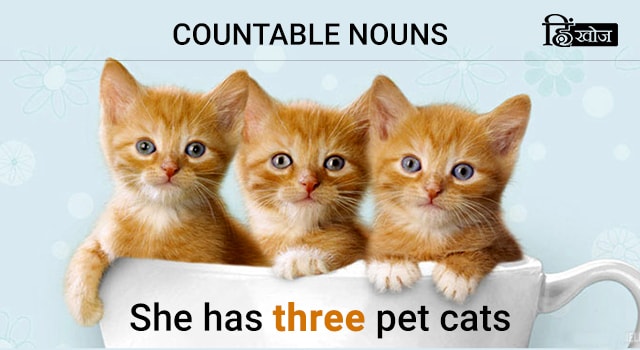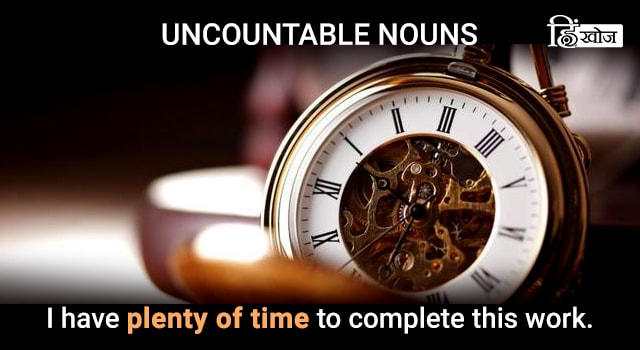I think the number of people who are confused between the 'Countable and Uncountable Nouns' is UNCOUNTABLE.
Bad pun?
I know. (It's true though)
क्या आप जानते हैं कि अंग्रेजी में सभी संज्ञाएं countable (गणनीय) नहीं हैं?
Before I move further, let me make it clear to you that when I say countable, It refers to something that can be counted in NUMBERS as in 1,2,3, and so on; and no other measure units such as kilograms (weight), meters or inches (length), litres (volume), etc.
आपने English का यह phrase तो सुना ही होगा: 'get your basics right!'
इस phrase का अर्थ है कि सबसे पहले हमे basic यानी मूल बातें समझने व सीखने की ज़रूरत है।
That's what we'll be doing today.
Knowledge of countable and uncountable nouns is a crucial step towards learning to speak English correctly.
Let's learn some basic rules about "countable and uncountable nouns."
COUNTABLE NOUNS
 ऐसी संज्ञा जिनकी गिनती संख्याओं में की जा सकती है, उन्हें 'countable nouns' यानी 'गणनीय संज्ञा' कहते हैं।
For example:
• I bought two books. ( मैंने दो किताबें खरीदीं।)
• She has three pet cats. ( उसके पास तीन पालतू बिल्लियाँ हैं।)
• There are at least 15 Indian restaurants in this area. ( इस क्षेत्र में कम से कम 15 भारतीय रेस्तरां हैं।)
Singular and Plural
Countable nouns have both singular and plural forms.
ऐसी संज्ञा जिनकी गिनती संख्याओं में की जा सकती है, उन्हें 'countable nouns' यानी 'गणनीय संज्ञा' कहते हैं।
For example:
• I bought two books. ( मैंने दो किताबें खरीदीं।)
• She has three pet cats. ( उसके पास तीन पालतू बिल्लियाँ हैं।)
• There are at least 15 Indian restaurants in this area. ( इस क्षेत्र में कम से कम 15 भारतीय रेस्तरां हैं।)
Singular and Plural
Countable nouns have both singular and plural forms.
| Singular = एकवचन | Plural = बहुवचन |
| Book | Books |
| Cat | Cats |
| Reataurant | Restaurants |
 Uncountable nouns are the things that we cannot count with numbers.
They include:
• Physical things that are too small or amorphous to count such as water, tea, coffee, air, money etc.
• Abstract things like beauty, happiness, time fear, love, safety, etc.
अक्सर लोग uncountable nouns के बोलने में गलती करते हैं क्यूंकि इन्हे ज़्यादातर singular form में ही प्रयोग किया जाता है जिसके कारण confusion पैदा होती है।
You should always keep this in mind that even though uncountable nouns are not individual objects, most of the time, they are singular.
But, there is a twist.
Even though they are considered to be singular, we never use 'a' or 'an' for the uncountable nouns.
Uncountable Nouns की quantity को दर्शाने के लिए हमेशा इन words और expressions का प्रयोग किया जाता है:
Some = थोड़ा, चंद, कुछ
• I wanted to loan some money from you.
• मैं आपसे कुछ/थोड़े/चंद पैसे उधार लेना चाहता था।
A lot of = बहुत सारा
• I am facing a lot of problems in this office.
• मुझे इस कार्यालय में बहुत सारी समस्याओं का सामना करना पड़ रहा है
Plenty of = बहुत, अधिक मात्रा में
• I have plenty of time to complete this work.
• मेरे पास इस काम को पूरा करने के लिए बहुत समय है।
A little bit = थोड़ा सा
• I need a little bit of help from you.
• मुझे आपकी थोड़ी मदद की आवश्यकता है।
Well, I hope this was helpful.
Learn more with the help of our blogs:
Comma Before ‘AND’: Why and When to Use It
Formal and Informal Uses of Contractions.
All You Need to Know About Metaphors
Improve your basics with the help of our English learning app Namaste English.
Uncountable nouns are the things that we cannot count with numbers.
They include:
• Physical things that are too small or amorphous to count such as water, tea, coffee, air, money etc.
• Abstract things like beauty, happiness, time fear, love, safety, etc.
अक्सर लोग uncountable nouns के बोलने में गलती करते हैं क्यूंकि इन्हे ज़्यादातर singular form में ही प्रयोग किया जाता है जिसके कारण confusion पैदा होती है।
You should always keep this in mind that even though uncountable nouns are not individual objects, most of the time, they are singular.
But, there is a twist.
Even though they are considered to be singular, we never use 'a' or 'an' for the uncountable nouns.
Uncountable Nouns की quantity को दर्शाने के लिए हमेशा इन words और expressions का प्रयोग किया जाता है:
Some = थोड़ा, चंद, कुछ
• I wanted to loan some money from you.
• मैं आपसे कुछ/थोड़े/चंद पैसे उधार लेना चाहता था।
A lot of = बहुत सारा
• I am facing a lot of problems in this office.
• मुझे इस कार्यालय में बहुत सारी समस्याओं का सामना करना पड़ रहा है
Plenty of = बहुत, अधिक मात्रा में
• I have plenty of time to complete this work.
• मेरे पास इस काम को पूरा करने के लिए बहुत समय है।
A little bit = थोड़ा सा
• I need a little bit of help from you.
• मुझे आपकी थोड़ी मदद की आवश्यकता है।
Well, I hope this was helpful.
Learn more with the help of our blogs:
Comma Before ‘AND’: Why and When to Use It
Formal and Informal Uses of Contractions.
All You Need to Know About Metaphors
Improve your basics with the help of our English learning app Namaste English.



